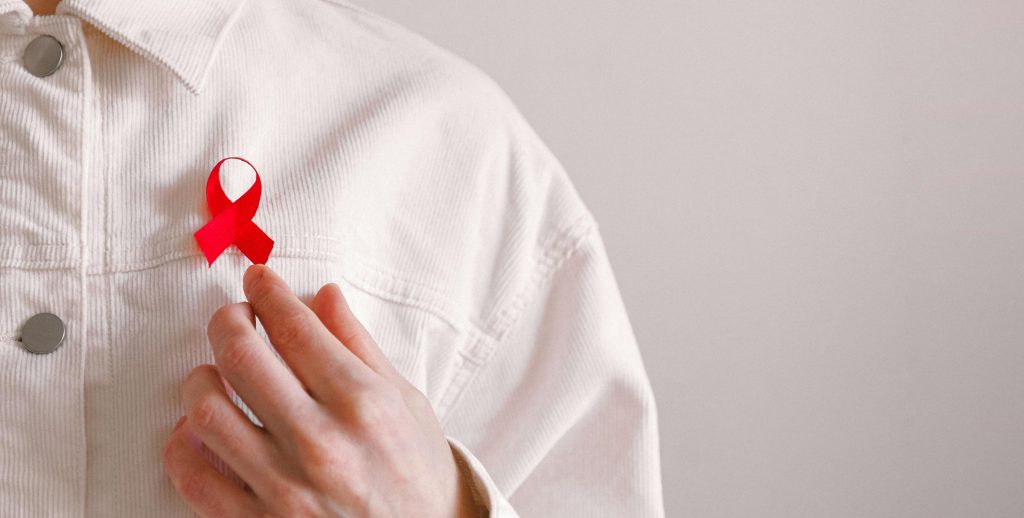The state of HIV and AIDs in the world today – World AIDS Day 2024
With World AIDS Day coming up on December 1, we thought we’d shine a light on the state of HIV in the world today and the progress being made fighting the infection, both in the UK and around the world.

It’s important we all do everything we can to prevent the spread of HIV. Get tested today with Better2Know’s at-home HIV test.
What is HIV/AIDS?
HIV (Human Immunodeficiency Virus) is a viral STI that attacks the body’s immune system, specifically the CD4 cells (T cells), which are crucial for fighting infections. If left untreated, HIV reduces the number of these cells, making the body more vulnerable to infections and certain cancers.
Over time, HIV can lead to AIDS (Acquired Immunodeficiency Syndrome), the most severe phase of HIV infection. At this stage, the immune system is badly damaged, and the body struggles to fight off opportunistic infections and diseases.
The first verified case of HIV was taken in 1959, but the infection became more widespread in the 1980s. Initially, AIDS was observed in the US among men who had sex with men, which led to significant stigma and misconceptions about its transmission. However, it soon became clear that HIV could affect anyone, regardless of sexual orientation, gender, or race.
By 1983, scientists had identified HIV as the cause of AIDS. Throughout the 1980s and 1990s, the epidemic spread rapidly across the globe, prompting extensive research and public health campaigns.
The introduction of antiretroviral therapy (ART) in the mid-1990s marked a turning point in the fight against HIV/AIDS. These treatments have transformed HIV from a fatal diagnosis to a manageable chronic condition for many people.
The current state of affairs
Despite enormous advancements in treatment and care, HIV remains a serious health concern all over the world.
In 2023, AIDS claimed 630,000 lives globally. 1.3 million individuals were newly diagnosed with HIV, with nearly half of these cases occurring among young women and girls. This brought the total number of people living with HIV worldwide to 39 million.
Of these, nine million did not have access to essential antiretroviral therapy. Each week, 4,000 adolescent girls and young women worldwide are newly infected with HIV, and only half of the 1.7 million children living with HIV receive the necessary treatment. HIV infection rates among key populations are nine to 23 times higher than those in the general population. These figures underscore the ongoing severity of the HIV epidemic.
However, there are reasons to be optimistic.
Globally, HIV/AIDS is declining, according to the WHO. Since 2010, the number of people acquiring HIV has been reduced by 39%, and HIV-related deaths have dropped by 51%.
The United Nations has set targets to continue this effort, striving to meet the following targets by 2025:
- 95% of all people living with HIV should have a diagnosis
- 95% of diagnosed people should be taking lifesaving antiretroviral treatment
- 95% of people living with HIV treatment should achieve a suppressed viral load to reduce transmission
In 2023, of all people living with HIV, 86% knew their status, 77% were receiving antiretroviral therapy, and 72% had suppressed viral loads.
The UK
In the UK, there are also reasons to be hopeful.
Two key tools have made the difference – getting more people tested, and getting people who are at high risk of HIV onto “PrEP” (pre-exposure prophylaxis – in other words, taking HIV medication to avoid getting infected and not passing it on to others).
In November 2024, the Government released an updated HIV Action Plan for England. The Action Plan highlighted progress on efforts to end new transmissions of HIV by 2030. UNAIDS targets were met. In 2023, 95% of all people with HIV were diagnosed, 98% of people diagnosed were receiving treatment, and 98% of people receiving treatment were virally suppressed. From 2022 to 2023, overall testing for HIV increased by 8%, and the number of people accessing PrEP (preventative HIV medication) increased by 11%.
However, challenges remain. Outside of London, new HIV diagnoses have risen by 21%, mainly among people who have been exposed through heterosexual sex. From 2019 to 2023, new HIV diagnoses decreased among white men exposed through sex between men by 44%, but no decline in HIV diagnoses has been seen among men from ethnic minorities.
The updated Action Plan drew attention to the “need for improved access and culturally competent support to HIV intervention across the whole pathway” but also reaffirmed that “the 2030 target of zero new HIV transmission is within our reach.”
Progress on ridding the UK of new HIV infections has been supported by the Elton John AIDS Foundation, the Terrence Higgins Trust, and the National AIDs Trust, which recently released a joint report.
This report outlined strategies to keep England on track to meet the Government’s target of no new HIV infections by 2030, emphasising home testing, discovering and monitoring undiagnosed HIV infections, widespread distribution of pre-exposure prophylaxis, and providing ongoing care to people living with HIV.
Final thoughts
While setting and achieving targets is a crucial part of fighting HIV, constant vigilance is needed.
Achieving targets doesn’t mean the end of the battle, and it’s important to sustain the gains made in the last few years. Doing so will involve continued, large-scale investments in long-term treatment and health services, especially for young men and women already infected who face discrimination and violence and who have to deal with persistent stigma and criminalisation in certain parts of the world.
Further difficulties are presented by climate change, conflicts, and new global infections that divert resources away from healthcare, treatment, and research. The search also continues for a cure for HIV.
However, current and future challenges shouldn’t prevent us from celebrating the progress being made. With new efforts to tackle challenges posed by this pernicious infection, it is possible to imagine a world without HIV.
For more information about how to participate in World AIDS Day, visit the National AIDS Trust and the Terrence Higgins Trust.
If you’re worried about the possibility of having HIV, you can help to stop the spread by seeking testing and treatment. Get in touch with Better2Know today to find a sexual health clinic near you today.
Click the button below to book your appointment now.

We can all do our part to fight the spread of HIV. Protect yourself and your loved ones by getting tested at a sexual health clinic near you.
This article has been medically reviewed by Dr. Steve Chapman, 10/12/2024.
Categories
- Awards
- Bacterial Vaginosis
- Blood Tests
- Cervical Cancer
- Chlamydia
- Condoms
- Covid-19
- Gardnerella
- Genital Warts
- Gonorrhoea
- Health and Wellness
- Hepatitis A
- Hepatitis B
- Hepatitis C
- Herpes
- HIV
- HIV (AIDS)
- Home Testing
- HPV
- Instant Testing
- MSM
- Mycoplasma
- News
- Non-Specific Urethritis
- PAP Smear
- Pre-Pregnancy
- Sexual Health
- STD Symptoms
- STD Tests and Screens
- STI Transmission
- Stigma
- STIs
- Swab Tests
- Syphilis
- Trichomonas
- Ureaplasma
- WSW
- Zika




